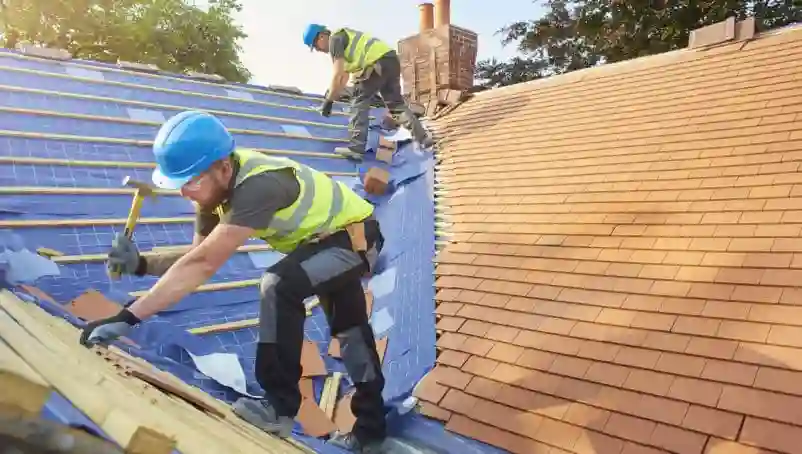Selecting the right roofing materials for your home or commercial property is a crucial decision that can have a significant impact on your property’s aesthetics, energy efficiency, and long-term durability. Roofing contractors play a pivotal role in guiding you through the material selection process, offering their expertise and recommendations to ensure that your roofing project is a success. In this article, we’ll explore the various roofing materials available, discuss the factors to consider when choosing them, and provide recommendations for making informed decisions with the help of your roofing contractor.
Types of Roofing Materials
Roofing materials come in a variety of options, each with its own set of advantages, disadvantages, and suitability for different architectural styles and climate conditions. Here are some of the most common roofing materials used by roofing contractors:
- Asphalt Shingles: Asphalt shingles are the most popular roofing material due to their affordability, versatility, and ease of installation. They come in various colors and styles and are suitable for most residential applications.
- Wood Shingles or Shakes: Wood shingles and shakes offer a classic and natural appearance. They are often used for homes with a traditional or rustic aesthetic. Cedar and redwood are common wood choices.
- Metal Roofing: Metal roofing has gained popularity for its durability and longevity. It comes in a range of materials, including steel, aluminum, and copper, and offers excellent resistance to weather, fire, and pests.
- Slate Roofing: Slate roofing is prized for its elegant appearance and longevity. It is a natural stone material that can last for over a century when properly installed and maintained.
- Tile Roofing: Tile roofing, often made of clay or concrete, provides a distinctive look and is commonly associated with Mediterranean or Spanish-style architecture. It offers excellent durability and insulation properties.
- Flat Roofing Materials: For commercial properties or modern home designs, flat roofing materials like EPDM (rubber), TPO (thermoplastic), and built-up roofing (BUR) are popular choices due to their low-slope roof compatibility.
- Green Roofing: Green roofing involves the use of living plants and vegetation on the roof surface. It provides insulation, reduces stormwater runoff, and offers an eco-friendly aesthetic.
Factors to Consider When Choosing Roofing Materials
When selecting roofing materials, there are several key factors to consider:
- Climate: Your local climate, including temperature variations, precipitation levels, and exposure to severe weather, should influence your choice of roofing materials. Some materials are better suited to specific climate conditions.
- Budget: Determine your budget for the roofing project, including material costs, installation fees, and any additional expenses for structural modifications or insulation upgrades.
- Aesthetics: Consider the architectural style of your property and your personal preferences for the roof’s appearance. Some roofing materials offer a wide range of colors and styles to choose from.
- Durability: Assess the expected lifespan of the roofing material and its resistance to factors such as UV radiation, moisture, and impact. A longer-lasting material may offer better value in the long run.
- Maintenance: Different roofing materials require varying levels of maintenance. Consider your willingness and ability to perform regular inspections and maintenance tasks.
- Energy Efficiency: Some roofing materials, such as cool roofing options, can contribute to energy efficiency by reflecting sunlight and reducing heat absorption. This can lead to lower cooling costs in hot climates.
- Local Regulations: Be aware of local building codes and regulations that may dictate the type of roofing materials allowed in your area. Compliance with these codes is essential to ensure your project’s legality.
Recommendations from Your Roofing Contractor
Roofing contractors bring valuable expertise to the material selection process. Here are some recommendations your roofing contractor may provide to help you make informed decisions:
- Material Suitability: Your contractor will assess your property’s specific needs and recommend roofing materials that are well-suited to your climate, architectural style, and budget.
- Quality and Brand: Contractors often have experience working with different roofing material brands and can recommend reputable manufacturers known for producing high-quality materials.
- Cost Estimates: Roofing contractors can provide detailed cost estimates that include material costs, labor, and any additional expenses. This helps you plan your budget more effectively.
- Energy Efficiency: If energy efficiency is a priority, your contractor can suggest cool roofing options or materials with high solar reflectance and thermal emittance.
- Durability and Maintenance: Contractors can offer insights into the expected lifespan of different materials and the level of maintenance required to keep them in good condition.
- Warranties and Guarantees: Roofing contractors often work with materials that come with warranties. They can explain the terms of these warranties and help you choose materials that offer the best long-term protection.
- Code Compliance: Contractors are well-versed in local building codes and regulations and will ensure that the selected roofing materials meet all requirements.
- Installation Expertise: Your contractor’s experience with specific materials ensures proper installation, which is crucial for maximizing the material’s performance and longevity.
Final Considerations
Choosing the right roofing materials is a significant decision that should be made carefully in consultation with your roofing contractor. By considering factors such as climate, budget, aesthetics, and energy efficiency, and by seeking the recommendations of a reputable contractor, you can make informed choices that will lead to a durable, attractive, and long-lasting roof for your home or commercial property. Remember that a well-chosen roofing material not only enhances the appearance of your property but also provides essential protection against the elements for years to come.



